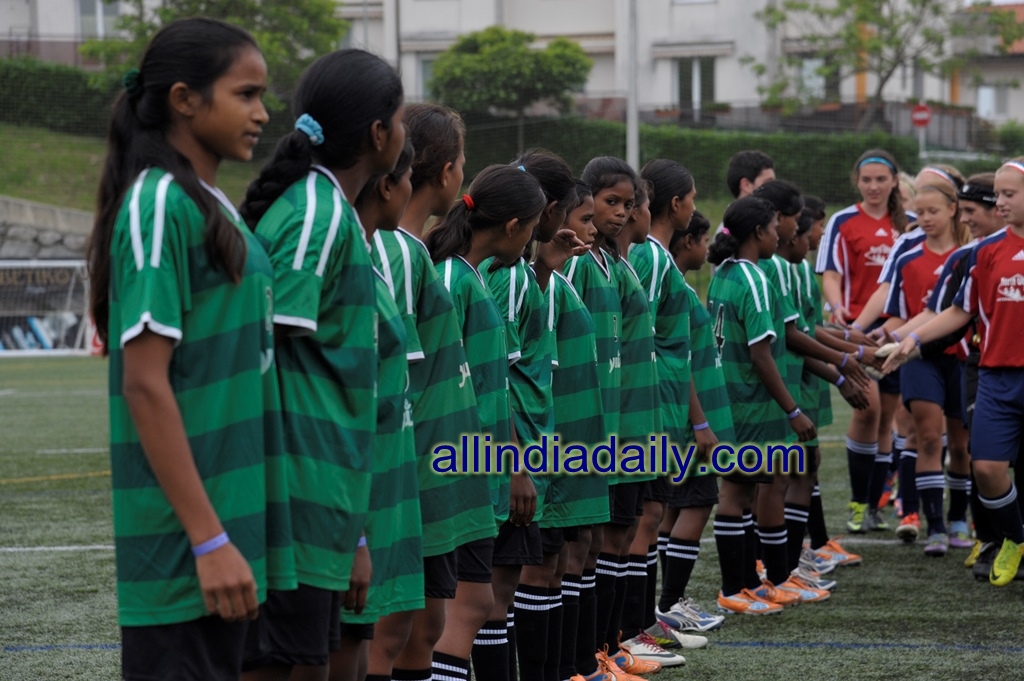
Few days back, as a billion plus India slept, a handful of tribal girls proudly held aloft a trophy they won in their maiden entry in a football tournament in far-flung Spain. It was the night of July 13. Hundreds of fire crackers lit the skies as the girls screamed Vande Mataram – their battle cry – for being placed third in the Gasteiz Cup, the world’s best testing ground for teenager football in Victoria Gastiez, also popular as Europe’s Green Capital.
They were the same girls who were slapped, kicked and made to sweep floors by arrogant bureaucrats in Jharkhand when the girls asked for birth certificates, a necessity to apply for passports. But they eventually managed their passports, thanks to a strapping American, Franz Gastler, who pushed the cases of the girls with mandarins of the Ministry of External Affairs in the Indian Capital.
 Based on Jharkhand, Yuwa is a non-Government Organization which used football as a vehicle to fight girl trafficking and child marriages in one of the most under-developed parts in the country. As per latest reports Jharkhand tops the list in human trafficking in India and it is a state where more than 60% of the female population is illiterate. Through Yuwa girls in Jharkhand villages are brought into football teams where they learn to take care of themselves as well as each other. The often attend studies in Yuwa clubs and in a state where girls are often married off by the time they turn 15, participants in Yuwa teams, as per their website, are never married before they reach the legal age. Franz Gastler, an American citizen who has been working in a tribal village for past f
Based on Jharkhand, Yuwa is a non-Government Organization which used football as a vehicle to fight girl trafficking and child marriages in one of the most under-developed parts in the country. As per latest reports Jharkhand tops the list in human trafficking in India and it is a state where more than 60% of the female population is illiterate. Through Yuwa girls in Jharkhand villages are brought into football teams where they learn to take care of themselves as well as each other. The often attend studies in Yuwa clubs and in a state where girls are often married off by the time they turn 15, participants in Yuwa teams, as per their website, are never married before they reach the legal age. Franz Gastler, an American citizen who has been working in a tribal village for past f
our years, was an English teacher for poor children when he was requested by the girls to teach football and he eventually became the football coach for “Yuwa India” a U14 team built solely with girls from local villages. Yuwa’s reach has also increased over the years as now they boast of over 200 girls under their wing, having started with 15 in October 2009. 13 year old Pushpa Toppo, a Yuwa girl, has even represented India in AFC U14 tournament. In 2012, Yuwa became the first
organization from India to win the prestigious Nike Gamechangers Award.
He was a lone ranger in his efforts. The girls were lovingly titled the Supergoats by the organizers in Spain the moment they saw the girls playing barefoot in practice matches on arrival. Why?
The girls had limited football gear and could not take the risk of tampering it before the tournament. They were overawed by international teams in the first tournament, the Donosti Cup, but came to their own in the second tournament.
Offering a consolation prize for the third team – winner of a match between losing semi-finalists – was a mere formality for the organizers. But for the girls, it was a giant leap into global soccer from their impoverished Rukka village near Ranchi, considered one of the world’s epicenters of child marriage and human trafficking.
As soon as the announcement was made for the prize distribution ceremony, the girls rushed into their dressing room and returned, some barefoot, wearing red-bordered white saris, their traditional festive dress. Many had their plastic flowers in their hairs.
And when they huddled together after the mandatory photo session, some wept inconsolably because they had almost given up their hopes to participate in this tournament.
“They were over the moon. It was their night,” said Gastler of the girls, who subsist on less than a dollar a day. For a country low on soccer, this was - arguably - good news for the mandarins of the game. But no one cared. All India Football Federation (AIFF) president Praful Patel was not aware of the girls’ superlative achievement, nor was the country’s new sports minister Jitendra Singh.
“We could not sleep that night (July 13),” says Rinky Kumari, 13, captain, Supergoats. Once she bunked her school helped her mother do household chores. Today, thanks to football, everyone knows her name in the village.
She says she remembered the days she was slapped and sweep floors when she went to the Panchayat Office get birth certificates for her passport. “That is the pain of being a tribal girl in India. I do not remember the slap, I remember the Cup,” says Rinky. For her, and her teammates, it means a lot.
Courtesy - http://www.allindiadaily.com/2013/07/yuwa-team-from-jharkhand-won-donosti-cup-in-spain.html


